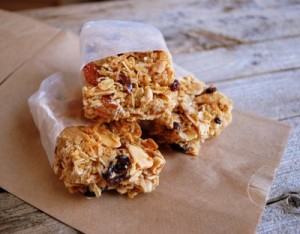Eating Grains And Losing Fat
 Last day Brad Pilon and I took a look at one dieting concept growing in popularity over in the UK – calorie restriction for longevity. Brad attended one of their research conferences to see first hand just what this practice was all about, and in part 5 of this interview series the dieting and nutrition expert hands down his verdict.
Last day Brad Pilon and I took a look at one dieting concept growing in popularity over in the UK – calorie restriction for longevity. Brad attended one of their research conferences to see first hand just what this practice was all about, and in part 5 of this interview series the dieting and nutrition expert hands down his verdict.
But for today I want to get to the heart of what confuses a lot of folks out there – grains and fat loss. Can you eat grains, and if so, how much is too much for fat loss? So let’s get right into it…
********************
Craig Ballantyne: Let’s move on to the next topic then, which is – I wanna ask you about is grains because people are very, very UP IN ARMS these days about eating carbohydrates in general but also eating rice, eating grains that contain gluten, eating bread, eating breakfast cereals.
What is your take on it as far as fat loss goes and then health goes?
Brad Pilon: Right, okay. So, in terms of fat loss, I like to look at things that we eat a lot of and see where we can step back.
The interesting thing that happened in our consumption pattern was around 1940, 1945. Since then, the amount of grains in our diet has been steadily increased as have the amount of fats and oils. And if you stop and think about it for a minute, it’s BECAUSE the combination of grains with fats and oils makes up predominantly a lot of the food that you can FIND IN BOX FOODS that have long shelf lives, right.
So, in other words, the big box store, super center-type grocery marketplace demand foods that have a decent shelf life, right, and so you have these foods that are a combination of grains and fats and everything from breakfast cereals, etc., because anything else like a protein-base food, unless we’re talking about beef jerky, you simply can’t keep on the shelf that long.
You can’t buy a tuna steak and then just leave it on the shelf for two-and-a-half weeks and then eat it; that’s not advisable by me anyway. But bread, cereal, granola bars, cookies, rolled oats things, whatever you want in that regard, oatmeal, they have great shelf life, which means that they are a really good thing to have in a store because they’re not gonna go bad sitting on your shelf.
So, they MADE A DEMAND for that, which means grain consumption went up largely.
So, if you wanna pick an area to cut back on, if you actually, for some reason, want to target a type of food to cut back on instead of just simply cuttin’ back on a little bit of everything then grains and fats are kinda the ones you look to just because you eat so much of them.
And then another reason is because grains and fats are traditionally what you’d find in packaged or boxed foods. And as we talked about earlier, those are the kinds of things we’d want you to cut back on anyway.
So, in terms of grains themselves being evil, I don’t understand why we always have to personify our food and pick which ones are the Darth Vaders of the food industry and which ones are the Luke Skywalkers.
I mean, in the right amount, there’s absolutely nothing wrong with grains unless you have some sort of grain allergy. But when you’re eating them in excessive amounts, I don’t care what the food is – there’s always an excessive amount somewhere – if you’re eating the excessive amounts then you’re gonna run into problems.
So, they’re not – like I said, grains aren’t the Darth Vader of the food industry, but they are something that we consume a lot of. So, if you cut back, you might see some benefit. But the way of looking at it is if you weren’t overeating to begin with, it’d be very difficult to eat too much grain, right, because you’d be limited by how many calories you’re taking in.
So, taking in too many grains, having problems with grains is usually just the effect of eating too much in general, again, unless you have some sort of allergy towards them.
Craig Ballantyne: Right. And then those packaged foods are the ones that are the easiest ones to overeat anyway, so.
Brad Pilon: It’s not something you have in your car, right. Like, you really just don’t eat a steak when you’re commuting into work everyday, but pop a couple granola bars into your car on the way in, easy, simple.
Craig Ballantyne: Well, no one in the history of the universe has ever been satisfied by one granola bar; that is  one of my rules.
one of my rules.
Brad Pilon: No. A serving size of granola bars is one box, right.
Craig Ballantyne: [Chuckle] Yeah, exactly.
Brad Pilon: Because the first couple ones just get you primed for it, right, like it’s – yeah. No, agreed.
Craig Ballantyne: Right. The first three make you hungrier and then about the ninth one in then you start to feel a little full.
Brad Pilon: Absolutely.
Craig Ballantyne: Yeah, so a good point there is if you’re eating a WIDE VARIETY of foods, which most people aren’t – that’s probably another area where if people just ate a wider variety of foods, and I’ll have you explain a little bit more about that ‘cause I know you’ve talked about it a bit, if you did that then you’d been EATING LESS GRAINS.
And if you didn’t overeat then you’d be eating less grains and then you could probably eat grains and keep ‘em in your diet.
Brad Pilon: Absolutely.
Craig Ballantyne: Okay great.
But what if you’re already following Brad’s advice regarding grains and you’re still not losing weight – what reasons might there be to explain these floundering fat loss results? Check out part 7.